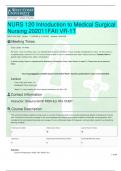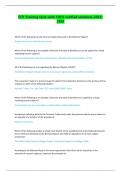WCU Ontario · College of Nursing
NURS 120 Introduction to Medical Surgical
Nursing 202011FAII VR-1T
202011FAII 2020 Section 11/02/2020 to 01/24/2021 Modified 10/24/2020
Meeting Times
Class Length: 10 weeks
For every 1 hour in a theory class, it is expected that students complete 2–3 hours of study in preparation for class. For this course, it
is expected that a minimum of 10–15 hours of study outside of class is completed each week. Please check your Student Portal for
specific class meeting times, dates, and locations.
In some courses, there is a required online Blackboard Collaborate Virtual Class Session in week 10. Please see course specifics
below.
You are not required to complete any pre-work before Week 1, however, preparation for class is recommended.
Lecture
Tues 0730-1230 weeks 1-9
Blackboard Virtual Classroom
Week 10 1 hour meeting will have required attendance for Nurs 120
Contact Information
Instructor: Shauna Smith MSN-Ed, RN, CHEP
Course Description
This is the first medical surgical nursing course in a series of three devoted to learning the professional aspects of therapeutic nursing
care. The focus is on the key concepts in the care of patients with medical and surgical conditions utilizing the nursing process. Also
included is the role of patient advocate and manager of care, utilizing principles of therapeutic communication, research, and teaching
learning concepts.
Total Course Credits: Total Course Hours: Lecture Hours In-Class:
3 45 45
Lab Hours: Supervised Clinical/Practicum Hours: Externship/Internship Hours:
0 0 0
Requisites
Course Prerequisites: NURS 100, NURS 101L
1 of 24
, Course Corequisites: NURS 121L
Course Learning Outcomes
1. Summarize the nursing process in care of the patient with alterations in health.
2. Classify priorities in the care of patients with alterations in health using the following applicable concepts: oxygenation, nutrition,
perfusion, fluid/electrolyte regulation, infection/inflammation, tissue integrity, pain, metabolism, elimination, and safety.
3. Identify interprofessional collaboration/team management needs of the patient with alterations in health.
4. Examine the pharmacologic, nutritional, developmental, and teaching needs of the patient with alterations in health.
This course meets the following outcomes and competency standards:
Week CLOs PLOs ILOs AACN Essentials
1 1–4 1–9 1–7 I, II, III, IV, VI, VII, VIII, IX
2 1–4 1–9 1–7 I, II, III, IV, VI, VII, VIII, IX
3 1–4 1–9 1–7 I, II, III, IV, VI, VII, VIII, IX
4 1–4 1–9 1–7 I, II, III, IV, VI, VII, VIII, IX
5 1–4 1–9 1–7 I, II, III, IV, VI, VII, VIII, IX
6 1–4 1–9 1–7 I, II, III, IV, VI, VII, VIII, IX
7 1–4 1–9 1–7 I, II, III, IV, VI, VII, VIII, IX
8 1–4 1–9 1–7 I, II, III, IV, VI, VII, VIII, IX
9 1–4 1–9 1–7 I, II, III, IV, VI, VII, VIII, IX
10 1–4 1–9 1–7 I, II, III, IV, VI, VII, VIII, IX
Program Learning Outcomes
College of Nursing Mission Statement
The mission of the College of Nursing is to provide evidence-based and innovative nursing education to culturally diverse learners, preparing
nurses to provide quality and compassionate care responsive to the needs of the community and the global society.
College of Nursing Philosophy
2 of 24
, The philosophy of the College of Nursing is that education is a continuous process occurring in phases throughout an individual’s
lifetime. Nurses are lifelong learners and critical thinkers.
Program Learning Outcomes
The following Program Learning Outcomes were selected to provide the essential body of knowledge and experience necessary to educate
students to move directly into their new role. For the undergraduate, this role is as professional registered nurses according to Support
professional nursing practice decisions with concepts and theories from the biological, physical, and social sciences.
1. Plan preventative and population-focused interventions with attention to effectiveness, efficiency, cost, and equity.
2. Support therapeutic nursing interventions for patients and families in a variety of healthcare and community settings using
evidence-based practice.
3. Apply nursing process and critical thinking when providing holistic, patient-centered nursing care to diverse populations.
4. Design healthcare education for individuals, families, and communities.
5. Comply with the professional standards of moral, ethical, and legal conduct in practice.
6. Develop an effective communication style to interact with patients, families, and the interdisciplinary health team.
7. Model leadership when providing safe, quality nursing care, when coordinating the healthcare team, and when tasked with
oversight and accountability for care delivery.
8. Use patient care technology and information systems when providing nursing care in a variety of settings.
Course Materials
Visit the West Coast University bookstore (https://bncvirtual.com/westcoastuniversity) to purchase any required materials, including
publisher access codes, as needed.
Please be aware that used textbooks may not include access codes, study guides and/or DVDs containing additional course materials
that may be required for the course. In some cases supplemental materials may be directly purchased from the publisher. However,
students will be held accountable for obtaining these materials in order to meet all course requirements.
Publication Manual of the American Psychological Association
Author: American Psychological Association
Publisher: American Psychological Association
Edition: 7th
Optional
Manual of Laboratory & Diagnostic Tests
Author: Fischbach, F. & Dunning, M. B.
Publisher: Lippincott Williams & Wilkins
Edition: 9th
Medical-Surgical Nursing: Assessment and Management of Clinical
Problems
Author: Lewis, S. L., Dirksen, S. R., Heitkemper, M. M., & Bucher, L., & Camera, I. M.
Publisher: Mosby Elsevier
Edition: 11th
Recommended Texts, Learning Resources
U.S. Department of Health and Human Services. (2008). AIDS Info: A Service of the U.S. Department of Health and Human
Services. Retrieved from http://www.aidsinfo.nih.gov
American Diabetes Association (http://www.diabetes.org) National
Kidney Foundation (http://www.kidney.org)
3 of 24





